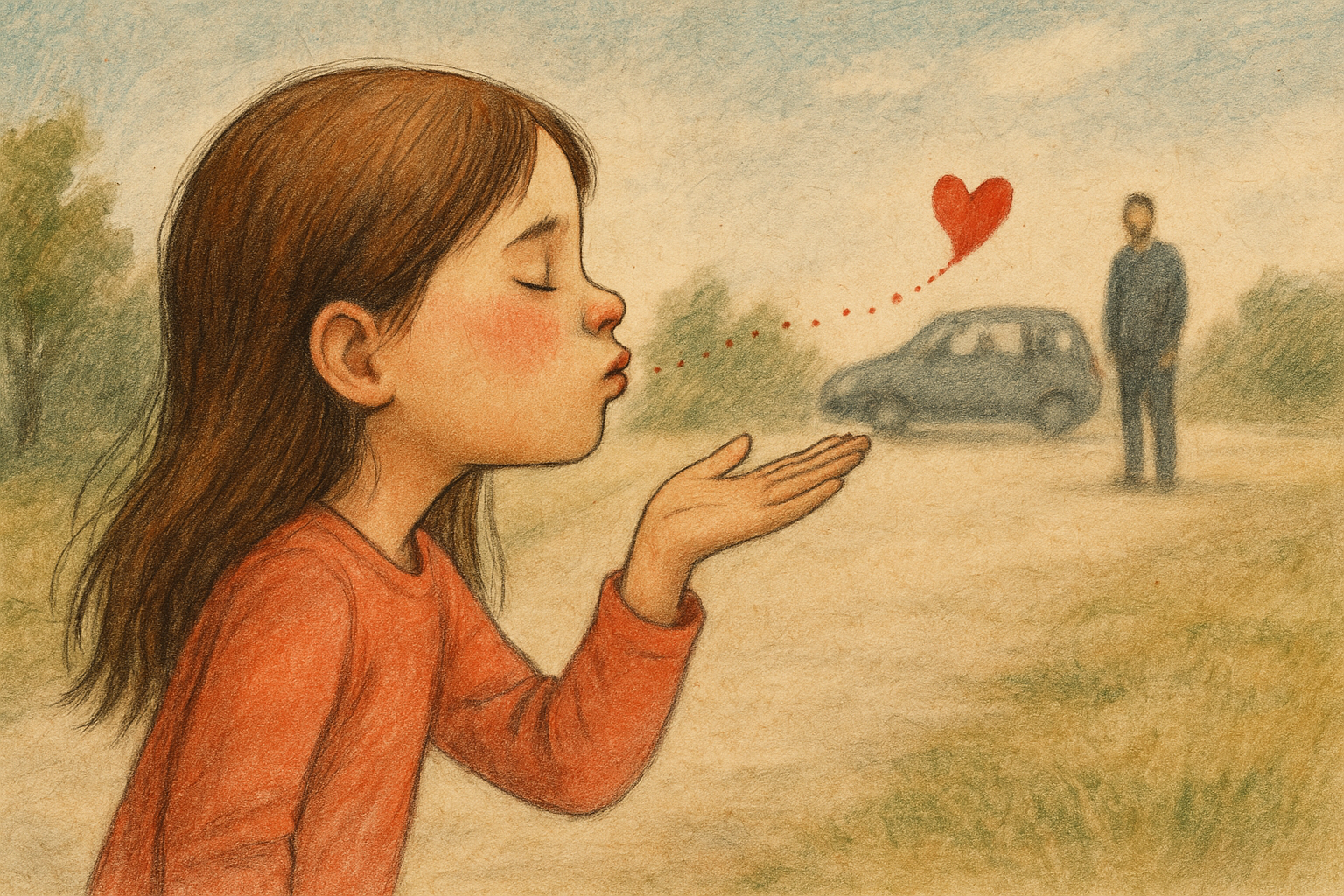
Once upon a time, there was a ten-year-old girl. Her name was Lía, and she was a bright child—much brighter than the adults thought.
One day, out of the blue, they told her she couldn’t see her dad anymore.
They said he was a bad man, that he was dangerous. That he could hurt her. At first, Lía believed them. The adults seemed convinced, they used serious and sad words.
A tired-looking woman in a grey dress—the social worker— told her it was “for her own good.” Another woman, wearing a black robe, explained it was “a protective measure.”
But Lía remembered things differently. She remembered her father’s hands helping her onto the swing, his voice reading bedtime stories, his eyes—tired, but kind, and most of all,
the way he looked at her: as if she was the most important thing in the world.
And so, little by little, something inside her began to doubt. Maybe not everything they were saying was true. Maybe some were using big words to hide something very small,
but very important: **the truth.**
Then one day, as she was leaving the house, she saw a car parked in the distance.
Inside was her father. Lía stopped. Her heart was pounding. She knew she wasn’t supposed to go near. She knew someone would call her back. But she felt that moment belonged to her.
To her alone. So she raised her hand and blew him a kiss. A small, trembling, silent kiss. But a true one. And that was the beginning of the revolution.
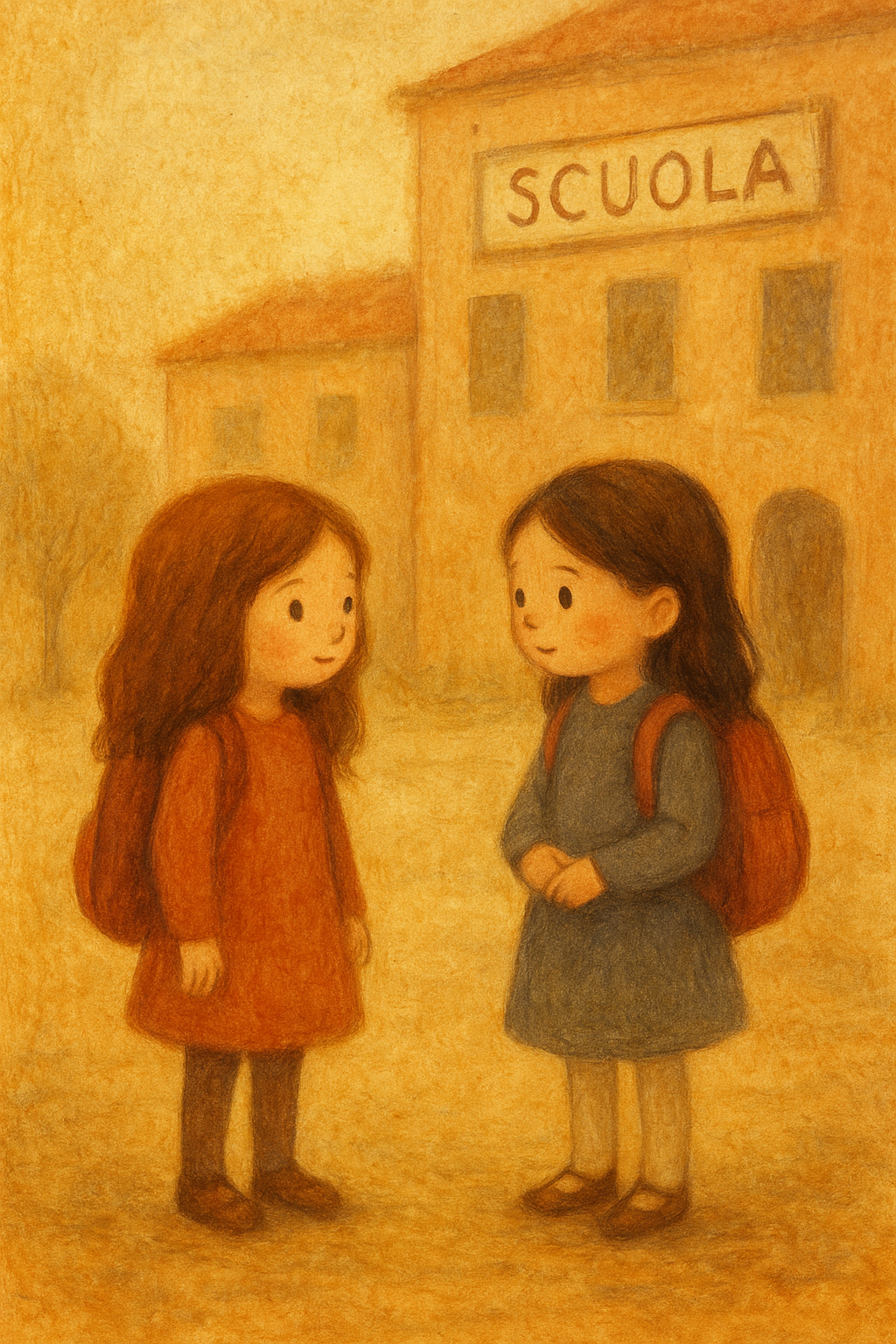
A few days passed.
Lía kept thinking about that kiss she had blown to her dad.
She hadn’t forgotten anything:
not the emotion she had felt,
nor the voice that had harshly called her back right after.
One morning, in class,
she heard the teacher talking about a field trip.
She said that all the classes would go,
even the parallel class, 1B.
And that’s when Lía heard a name that made her look up.
Emma.
Emma was a quiet girl from the neighboring class.
She didn’t talk much,
but Lía knew — she had overheard it in the hallway,
spoken softly between two adults —
that Emma also no longer lived with her dad.
That day, during recess,
Lía walked up to her.
She didn’t really know how to begin,
so she just said:
— “You too… can’t see your dad?”
Emma tensed up for a moment.
Then slowly nodded her head.
Lía looked into her eyes.
And said:
— “Do you… think that’s fair?”
Emma was caught off guard.
It seemed like she had never heard that question before.
As if no one had ever asked it.
As if it wasn’t even allowed to think it.
— “But… that’s what Mom said,” Emma replied.
— “And the judge said it too.
They do it for us.
They want to protect us…”
Emma’s voice trailed off gradually.
She wasn’t angry.
She was just confused.
And in the silence that followed,
Lía realized that something had started to shift.
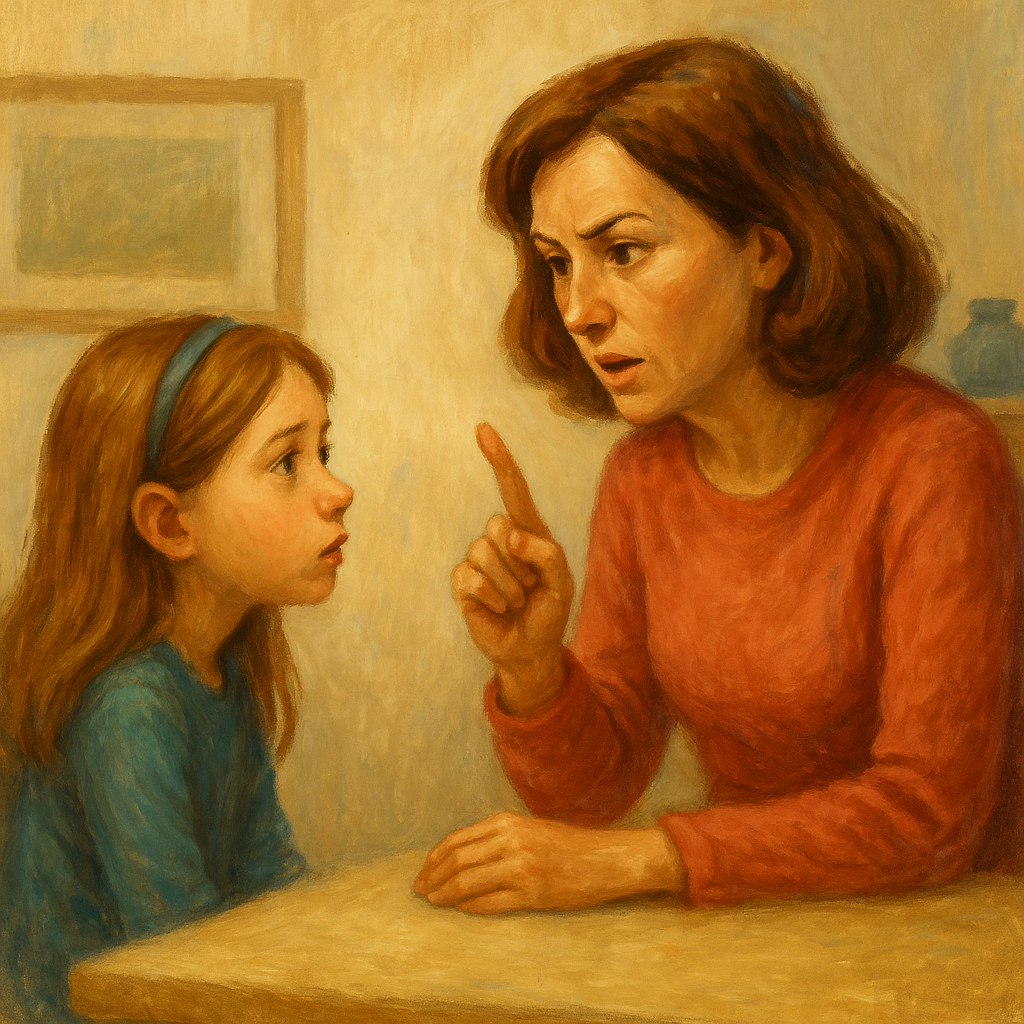
That evening, at home, Emma couldn’t sit still.
She had done her homework in silence,
had eaten dinner without saying a word.
But Lía’s question wouldn’t leave her mind.
“Do you think it’s fair?”
When her mom finally sat down on the couch,
Emma quietly walked over.
Her heart was beating fast,
as if she were about to do something dangerous.
— “Mom,” she said in a small voice,
“today a girl asked me if it was fair that Dad doesn’t live with me anymore.”
Her mother turned around immediately.
She looked at her seriously.
Too seriously.
— “Of course it’s fair,” she replied firmly.
— “The judge decided it.
And the judge is the person who says what’s right and what’s wrong.”
Emma didn’t reply.
She didn’t cry.
She didn’t ask any more questions.
She went to her room,
lay down on her bed,
and stayed awake staring at the ceiling,
while two different voices echoed in her head.
One was Lía’s,
speaking from the heart.
The other was her mother’s,
speaking from the law.
And for the first time,
Emma felt that those two voices weren’t saying the same thing.
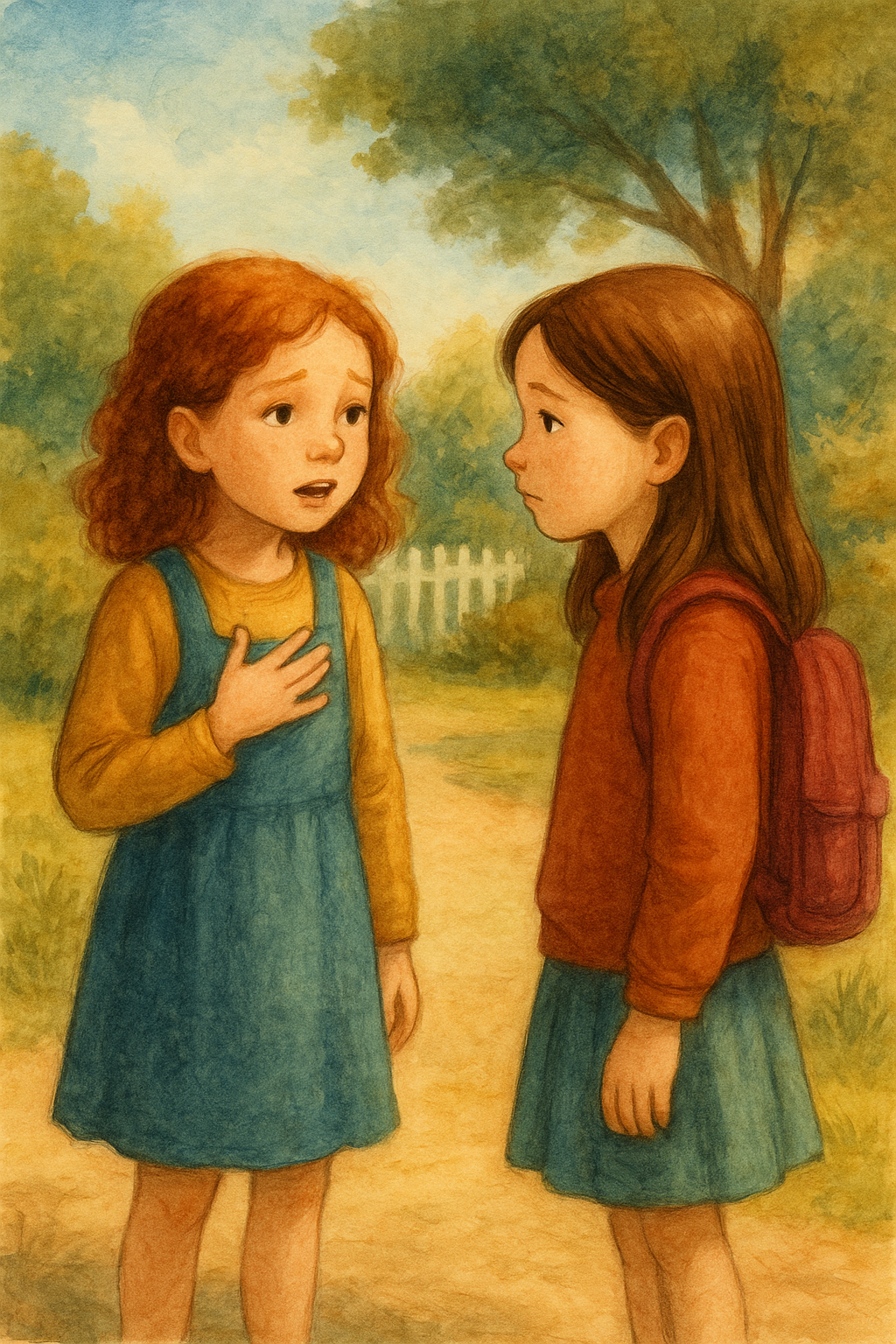
The next day, Emma and Lía met again during recess, under the big tree in the courtyard.
It was a somewhat hidden spot, rarely visited by other kids.
It felt like the right place to talk about important things.
Emma took a deep breath.
She didn’t want to get her words wrong.
— “Lía… last night I asked my mom if it was fair that my dad no longer lives with me.”
Lía looked at her in silence.
— “And what did she say?”
— “She said the judge decided it, and that the judge knows what’s right.”
Lía lowered her eyes.
Then, softly, Emma asked:
— “But you… where did that question you asked me yesterday come from? Why did you start thinking that way?”
Lía took a few seconds.
Then she said:
— “It came from my heart.”
Emma didn’t speak.
She waited.
— “Because I saw my dad from afar,” Lía continued,
“he was waiting in the car for my brother.
And in that moment, something inside me pushed me to walk toward him.
I wanted to say hello.
I wanted to feel his hand stroke my hair again.
I wanted to feel his kiss on my forehead.”
The words came out slowly, but clearly.
— “It was a strong need, Emma.
It wasn’t a whim.
It was like when you're thirsty.
You just need to drink.”
Then Lía paused.
Her gaze turned more serious.
— “But my mom called me back right away.
With a voice that left no room for choice.
And I went back home.
But as I walked away, I felt something inside me…
a voice asking: ‘Why?’
Why wasn’t my need heard?”
Emma looked at her.
There were tears in her eyes, but it wasn’t sadness.
It was something new, something stronger.
And that voice that had buzzed in her head the night before was now beginning to become her own.
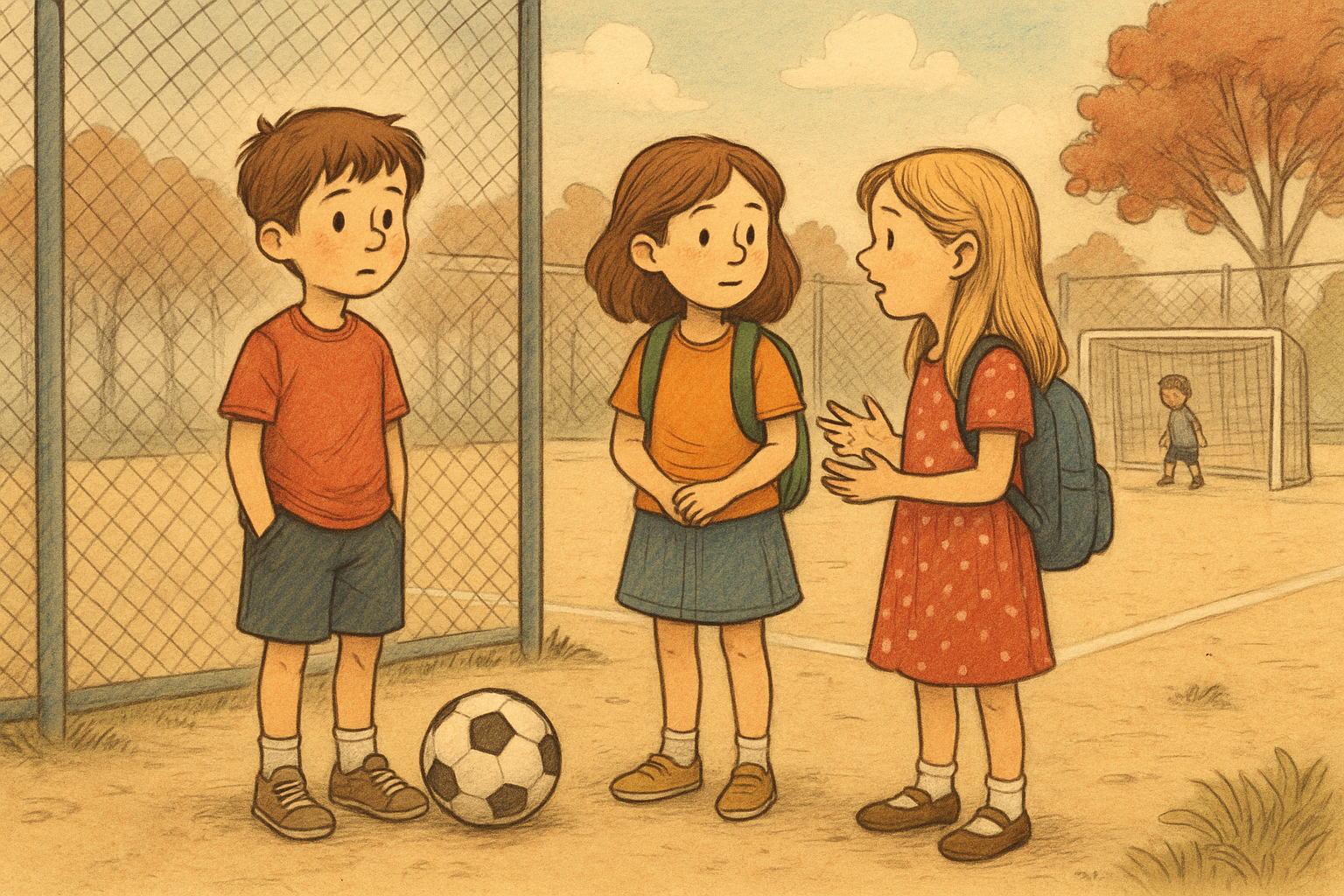
That day, Emma approached Lía with a determined step.
Her heart was pounding, but deep inside she felt she was doing the right thing.
— “I know another boy,” she said,
“his name is Francesco.
He also lives far from his dad.”
Lía looked up.
— “Him too?”
— “Yes.
He goes to a different school.
But I know he often plays soccer after school on the field near the park.”
The two girls looked at each other.
There was no need to say more.
They had made up their minds.
That afternoon, they met at the park gate.
Their backpacks still on, and a spark in their eyes — the kind that comes from searching for answers.
The field was there, dusty, with goalposts without nets and boys running and shouting.
Francesco was kicking the ball with two other boys his age.
He had black hair and deep eyes.
Emma stepped forward.
Her voice trembled slightly.
— “Hi… you’re Francesco, right?”
The boy stopped.
The ball rolled slowly on the concrete.
— “Yes. Who are you?”
His tone wasn’t hostile, just surprised.
Lía came up beside Emma.
— “We’re two girls from the nearby school.
We just wanted to ask you something.”
Francesco stiffened a little.
— “What is it?”
— “Is it true you live far from your dad?”
Francesco looked down.
For a moment, he seemed like he wanted to run away.
Then, seeing the sincerity in the girls’ eyes, he relaxed a little.
— “Yes.
I live with my mom.
Dad can’t even come watch me when I play soccer.”
Silence fell between the three.
— “And… do you miss him?”
Lía asked in a whisper.
Francesco didn’t answer right away.
He looked toward the ball, then toward the distant mountains.
— “I miss him when I score a goal and want to look him in the eyes.
I miss him when other kids take pictures with their dads after the game.
I miss him when I get hurt and no one knows how I like to be comforted.”
It was as if those words had been locked inside for too long.
Now they came out, simple and true.
Emma stepped a little closer.
— “We miss our dads too.”
Francesco gave a faint, bitter smile.
— “But nothing changes, does it?
Grown-ups decide everything.”
Lía shook her head.
— “Maybe… but maybe if we start talking to each other… something can change.
Maybe.”
Francesco looked at them both. Then, almost in a whisper, added:
— “There’s another boy who plays with me.
His name is Carlo.
He also hasn’t seen his dad in a long time.
When we score a goal, we hug tightly.
We don’t just do it to celebrate… we do it to remind ourselves we’re not alone.”
Emma lit up:
— “And where is he today?”
— “He stayed home.
Had a sore throat.
But he’ll be back tomorrow.
If you want, you can come again.
Maybe he’ll want to talk to you.”
The two girls looked at each other.
Their journey was taking on a new shape.
They were no longer just two.
The circle was growing.
And as the sun set behind the mountains, a faint but real light began to glow in their hearts:
the light of solidarity among children who are no longer afraid to ask questions.
Before parting, Lía and Emma approached Francesco one more time.
— “We’ll come back to the field tomorrow. Will you be here?”
Francesco nodded without hesitation.
— “I never miss a game.”
They smiled at each other. Then each one took the road home.
But something had changed.
It wasn’t just the soft breeze of late afternoon.
It wasn’t just the scent of freshly cut grass.
It was something felt deep inside.
A small seed had been planted.
A seed of doubt, awareness, and strength.
Maybe tomorrow they’d be three.
Or maybe four.
They walked home with a new thought.
It wasn’t clear yet, it didn’t have a name.
But inside them, a strange certainty was starting to grow:
that sometimes, to change something, all it takes is to start talking about it.
And that when there’s more than one, everything becomes just a little less hard.
And as they each returned to their own homes, Lía, Emma, and Francesco didn’t know it yet,
but they were already writing the first lines of a change that would stir consciences.
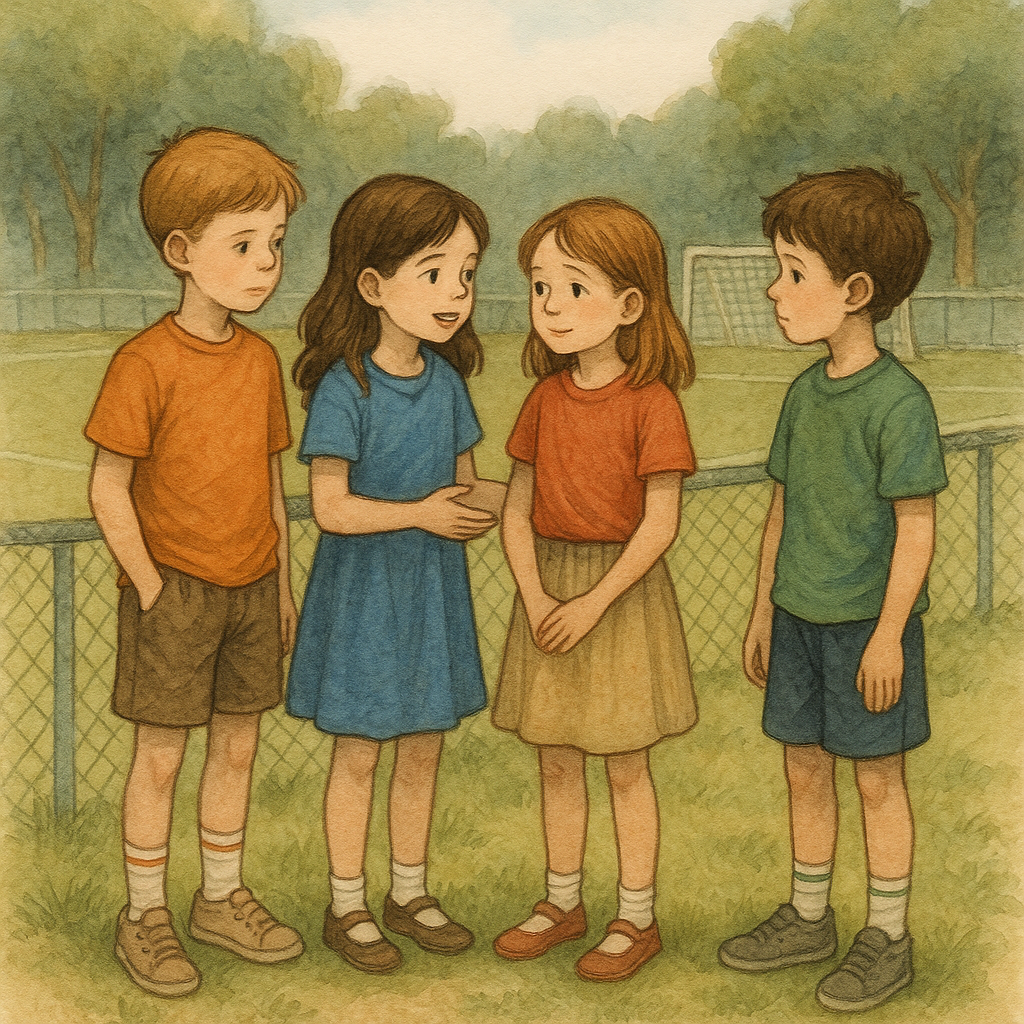
The next day, Lía, Emma, and Francesco were already at the field.
The sky was clear, and a new kind of air seemed to carry their thoughts.
Carlo arrived a little late, with the ball under his arm and red cheeks from running.
Francesco hugged him.
— “Hey, you’re here today!”
— “Of course I’m here. Always for soccer... and for you guys.”
They didn’t play much that afternoon.
They were more interested in talking.
In sharing.
It was Lía who broke the silence.
— “Did anyone ever ask you if you wanted to be apart from your dad?”
Emma shook her head. Francesco looked at the ground. Carlo bit his lip.
— “No.”
— “Me neither.”
— “Not me...”
That silence, more meaningful than a thousand words, was interrupted by a question.
— “But... does the judge know how we feel?”
They didn’t know.
And the more they thought about it, the more they realized that no one had truly listened to them.
Not their moms, who always spoke for them.
Not the social worker, who only said, “It’s for your own good.”
Not the teachers, who looked away with embarrassed glances.
Emma, Lía, Francesco, and Carlo looked at each other with new eyes.
— “What if we went to the judge ourselves? I know where he works,” said Francesco.
— “To tell him we didn’t agree.”
— “To ask: why?”
And so a simple, bright idea was born.
None of them really knew how to do it, or even if it was possible.
But they wanted to understand.
And that desire to understand was different from anything else.
It wasn’t anger. It wasn’t crying.
It was a spark.
A small, pure spark of truth.
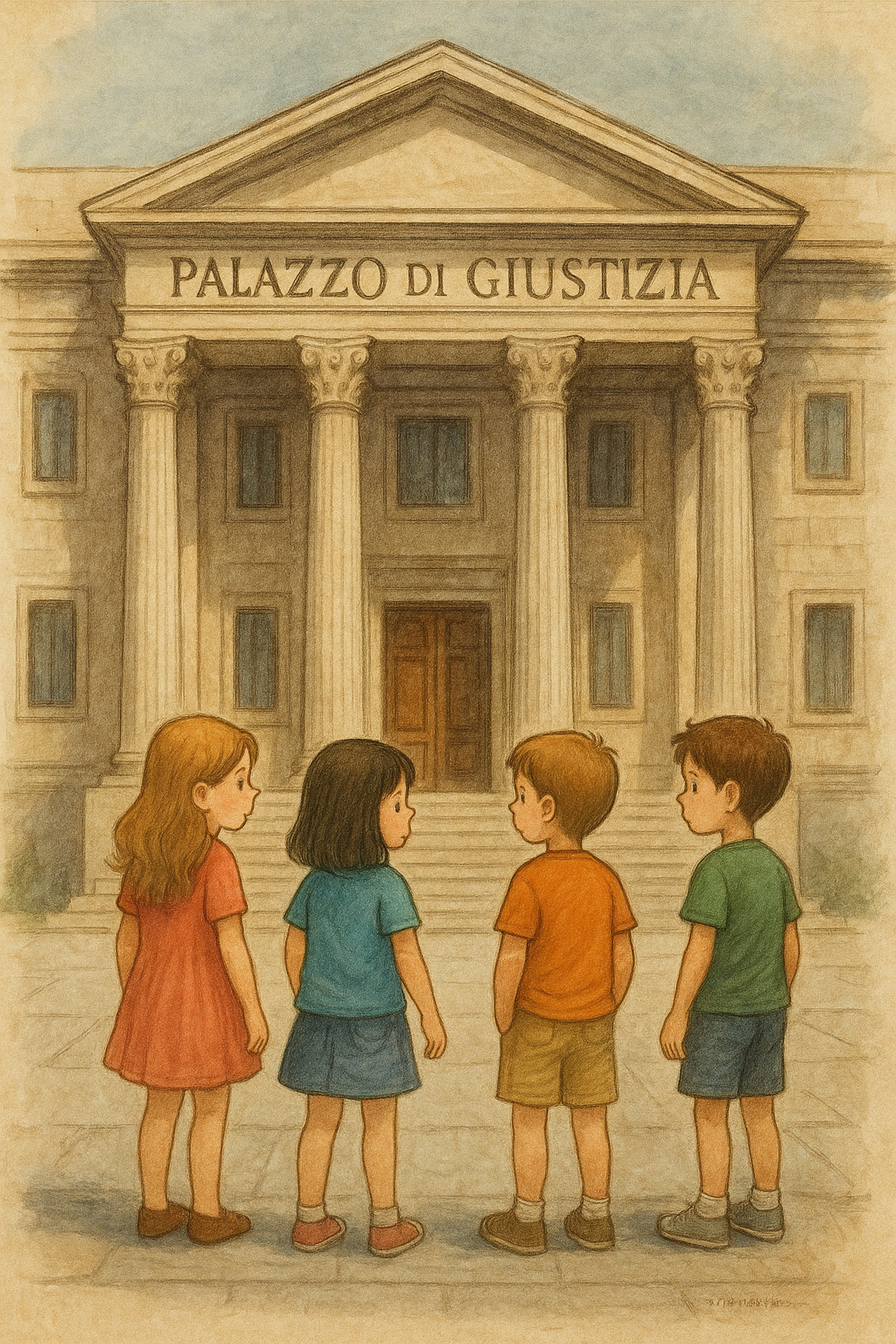
One Monday afternoon, Lía, Emma, Francesco, and Carlo met up after school.
They had made a decision: they would go speak to the judge.
They didn’t know exactly how, but they knew where.
There was a large building in the city center, imposing, with columns and tall glass windows.
Above the entrance, a solemn inscription: PALACE OF JUSTICE.
That was the place.
They arrived together, backpacks still on their shoulders and hearts pounding.
They stopped for a moment in front of the door.
Then Lía, without saying a word, stepped forward and pushed it open.
Inside, an echoing silence.
Shiny floors. Cold lights.
And a man in uniform sitting behind a counter.
He looked at them with a raised eyebrow.
— “Where do you think you’re going, kids?”
— “We’re looking for the judge,” said Emma firmly.
— “We have questions for him,” added Francesco.
The man looked at them for a moment, then stood up.
— “You don’t just go in to see the judge, children. This isn’t a place for you. Who sent you?”
— “No one,” replied Carlo. “We came on our own. Because no one ever asked us what we think.”
The man sighed, then his expression seemed to change.
Perhaps struck by the determination in their eyes.
— “Go home, little ones. This is not a matter for children.”
But the children didn’t move.
They didn’t cry.
They didn’t shout.
Lía looked the man straight in the eyes and said:
— “Then tell the judge that today four children came looking for him. That they only wanted to be heard. Just that. To be heard.”
And they left.
Hand in hand.
Not with disappointment, but with something new in their hearts.
They had understood that the road would be long.
But that day, even just for a moment, the silence had trembled.
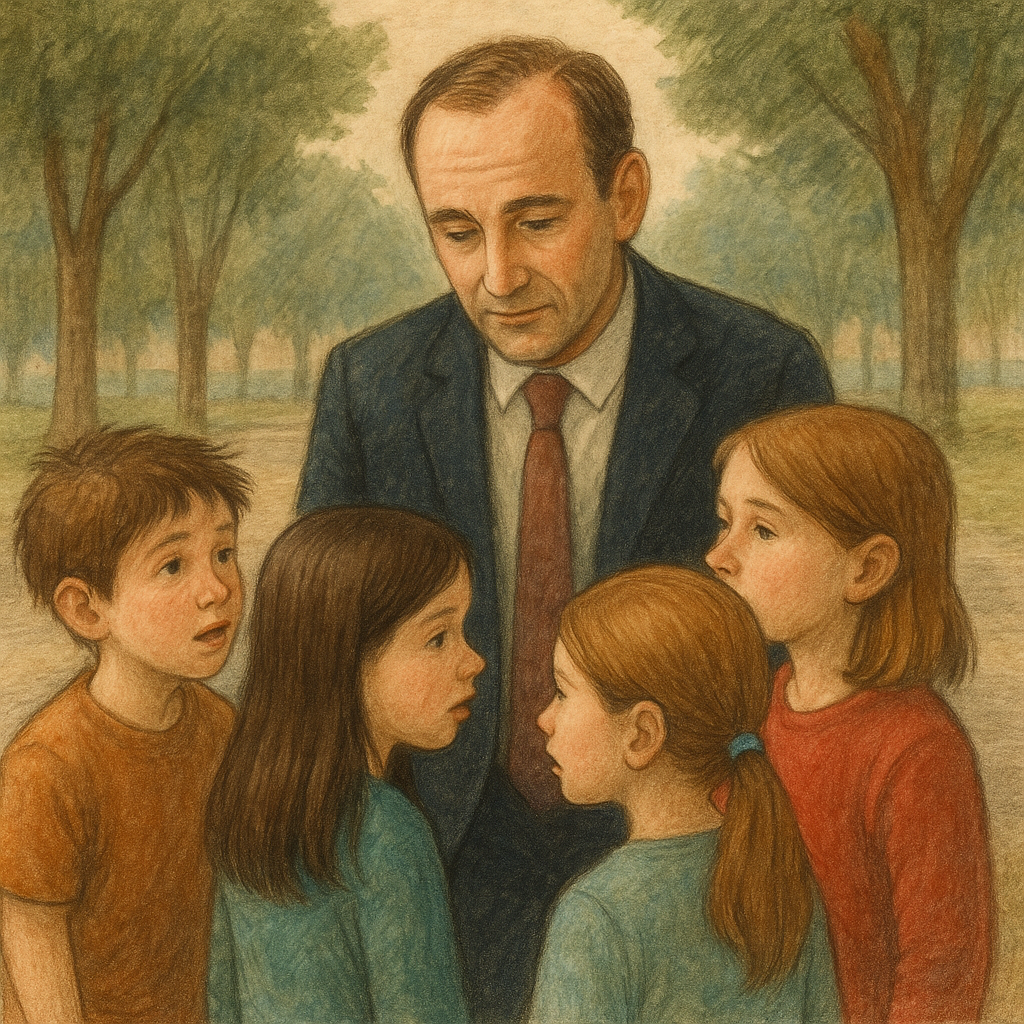
The four children were about to walk away from the entrance of the Palace of Justice when a gentle voice stopped them.
— “Wait a moment. I heard what you told the doorman.”
It was a distinguished man, holding a leather folder under his arm and wearing a red tie with thin stripes.
His gaze was tired, but kind. The kind of gaze that listens.
— “What do you want to say to the judge?” he asked again.
The children looked at each other, a bit hesitant.
Then Carlo stepped forward.
— “We want to know why we were separated from our dads.”
— “Why we can’t see them,” added Francesco.
— “Why they tell us it’s for our own good, but it hurts us,” whispered Emma.
— “We just want to know why. Just why,” concluded Lía.
The man looked at them for a long moment.
He didn’t laugh. He didn’t scold. He didn’t silence them.
Then he sat down on the bench next to the entrance and said:
— “You know… I’m a judge.”
The children held their breath.
— “Not yours. But one like him. And I want to say I’m sorry. Because maybe we’ve been too deaf. Too distant. Maybe we’ve forgotten that behind every file, there are eyes, hands, and little hearts like yours.”
— “Then… can you help us?” Lía asked hopefully.
The man hesitated. He looked at the sky, now turning golden.
— “I can’t change everything, children. But I can listen. And I promise that tomorrow I’ll speak about you. I’ll speak about what you did today. Because you’ve done something many adults don’t dare to do: you asked for the truth.”
The children sat next to him, one by one.
And they began to tell their stories.
That evening, for the first time, someone truly listened.
Not out of duty, but by choice.
And that gesture, so simple, stirred a conscience.
🌱 Final Fairy-Tale Chapter (for children)
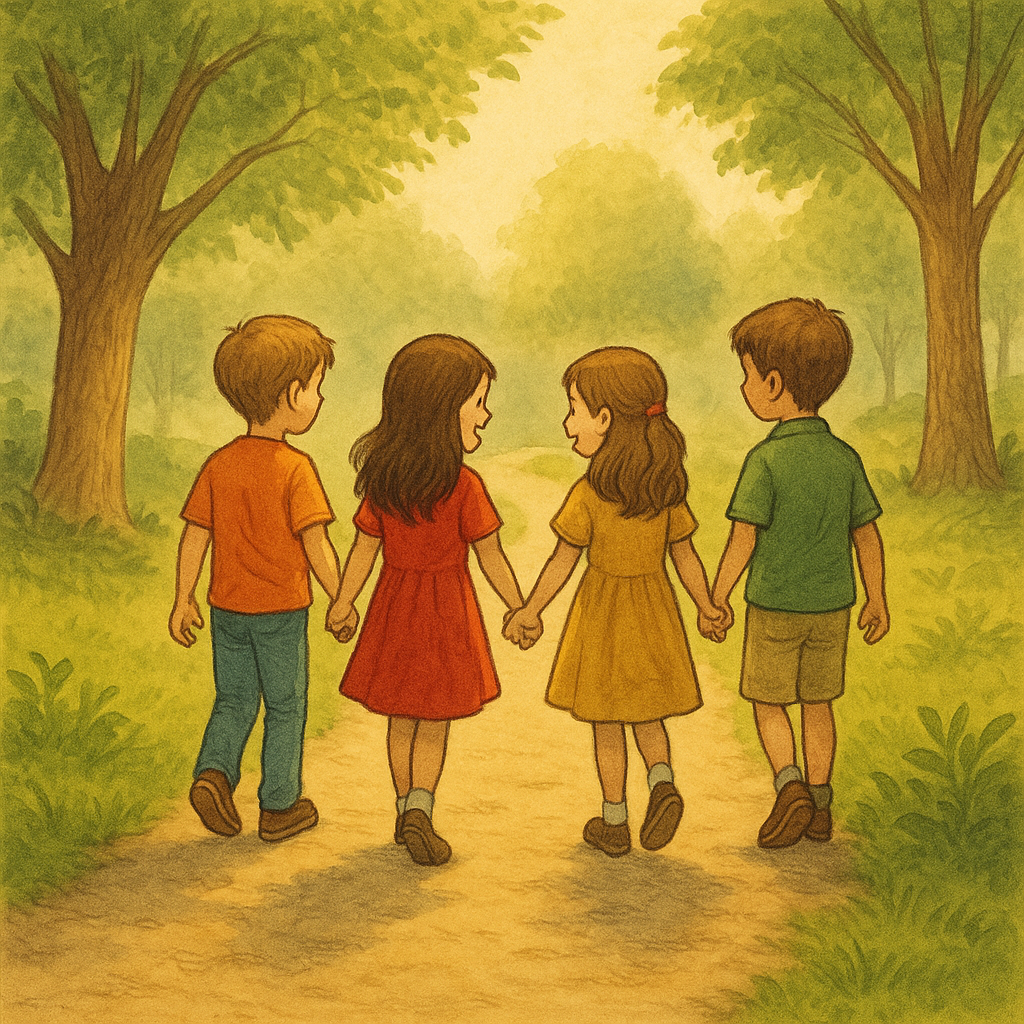
The four children walk away from the grand building with lighter hearts. No one knows if tomorrow will be different, but today, for the first time, they were heard. No one interrupted them. No one said, “This is not the time.” No one answered, “The judge has already decided.”
They walk home slowly, smiles in their eyes.
It’s not the smile of victory.
It’s the smile of someone who has found their voice again.
And as the sun sets behind the rooftops of the city, Lía turns and says:
— So it’s true… even children can speak and say what they think.
And deep inside, they all feel it:
yes, we have the right to be heard.
⚖️ Epilogue for Adults: The Judge’s Reflection
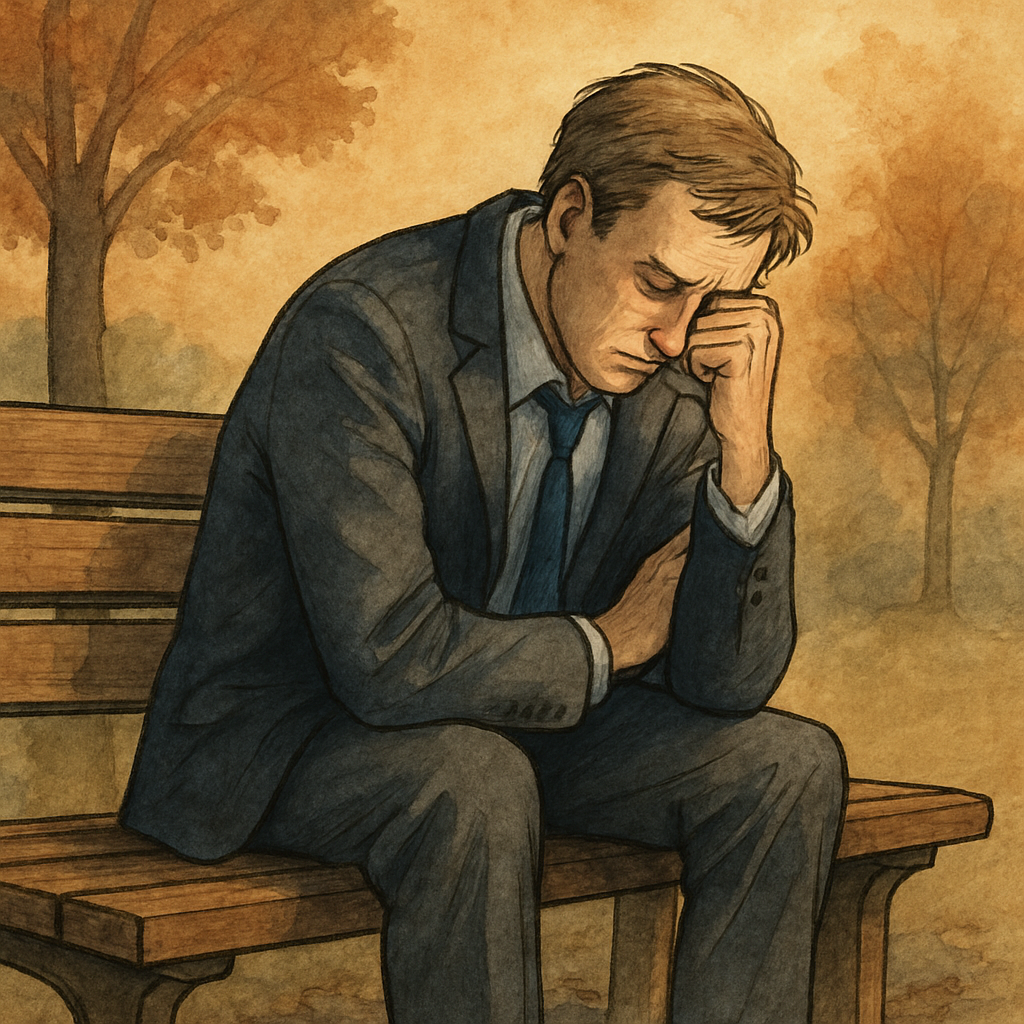
Left alone, the judge sits on the bench near the entrance.
In his robe, he no longer feels honor—only weight.
“What kind of justice are we serving today?” he asks himself.
“When did we stop listening? When did we start replacing heart with code, listening with formula, love with procedure?”
That day, no decree was issued.
No sentence was written.
Only silence. And four voices still echoing.
Perhaps, the judge thinks, the law is not made to close, but to open.
And perhaps, for every child who finds the courage to speak today,
an adult can still learn how to listen.